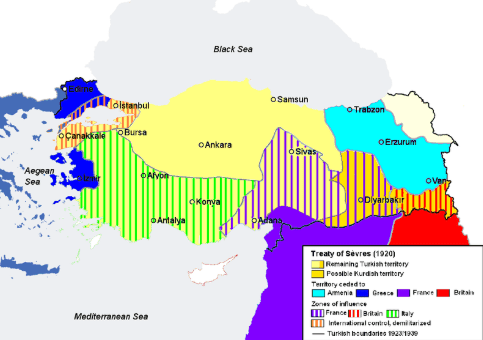Division of Ottoman Territories
One important point of the agreement was the division of the Ottoman Empire in the Middle East. France took over Lebanon, Syria, and territory in southern Anatolia, while Britain took over Palestine and Iraq. The provisions of this distribution have been decided in the secret agreement of Sykes-Picot in 1917.
Meanwhile, Greece was active in resistance to Ottoman control of Smyrna, although technically it remained within the Ottoman Empire. However, the Smyrna people were given a referendum choice about whether they wanted to remain in the Ottoman Empire or join Greece.
While Italy was given the Dodecanese Islands as well as influence in the coastal region of Anatolia.
The agreement made the Strait of Dardanelles into international waters and disarmed the Ottoman Empire's power over it. In addition, several ports near Istanbul are changing as free international zones. This is a territorial loss for a country.
The Sevres Agreement aims to secure Allied interests in the Middle East. In addition, the Allies also obtained oil resources that were recently discovered in the area.
The Sevres Treaty also recognizes certain regions as independent sovereign states, including the Kingdom of Hijaz and Armenia.
The agreement of the Sevres Agreement also benefited the Kurdish struggle. This is because in the agreement it was agreed to establish an independent Kurdistan region, which had previously been under the Ottoman rule. Although in its development the agreement was never eliminated for Kurds.
Military Sanctions and Economy of the Sevres Agreement
Similar to other agreements signed by the Central Bloc, the Sèvres Treaty imposed severe military restrictions on the Ottoman Empire. The Ottoman Army was restricted to only 50,000 people.
In addition, Ottoman was also banned from having the air force and navy reduced to only thirteen ships. Under the Treaty of Sevres, the Allies were given the power to implement these provisions.
The financial consequences of the Sèvres Treaty matched the Treaty of Versailles in terms of severity; however, the new Weimar Germany is still allowed to run its own economy.
Heavy sanctions were also imposed on the economy, Ottoman rule over the financial and economic sectors was taken over and handed over to the Allies. The takeovers included controls from the Ottoman Bank, controls on imports and exports, control of the national budget, control of financial regulations, loan requests and tax system reform.
The Allies even control debt payments. One condition is that only France, Italy and the United Kingdom can become holders of debt bonds. The Ottoman Empire was also banned from having economic cooperation with Germany, Austria, Hungary and Bulgaria and all the economic assets of these four countries were liquidated in the Ottoman Empire.
The Sèvres Treaty also gave the Allies the right to reform the electoral system of the Ottoman Empire.
Turkish nationalist leader Mustafa Kemal organized a rebellion against the treaty right before the Grand Vizier, Ahmed Pasha, of the Empire ratified it. Pasha was overthrown and Kemal refused to sign the agreement, which he considered did not need to be hard.
Kemal argued that the agreement punished the Turkish people and not the leaders of the Ottoman Empire who had led the country into war. Thanks to the protested protests, the Allies and the new Turkish government were forced to renegotiate the agreement for Turkey.

